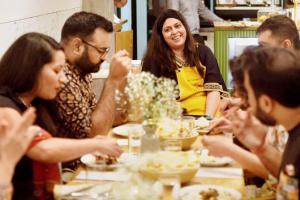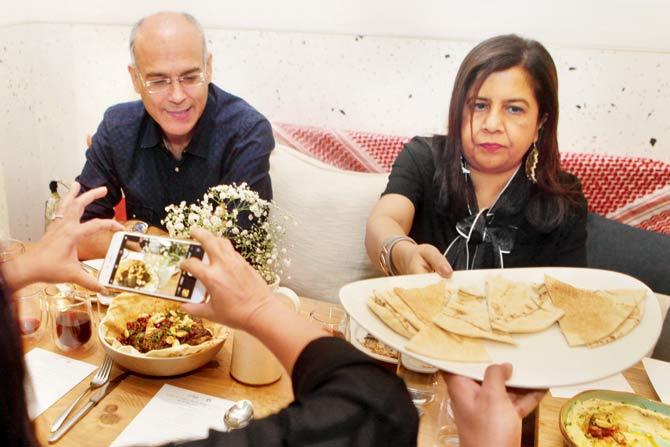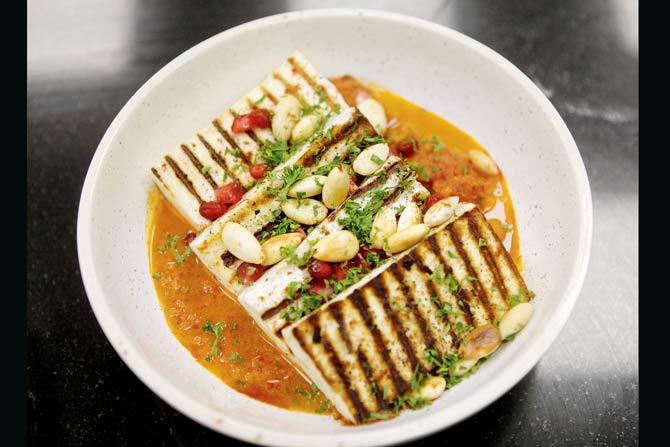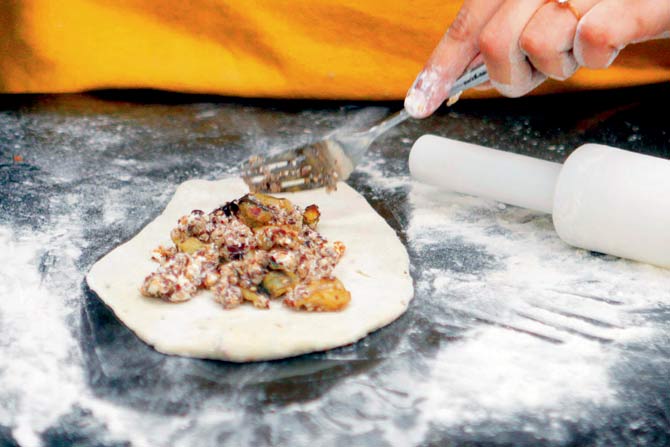Can India and Pakistan spar at the dining table? A foodie is merging her passion for cooking and history at pop-ups that give a taste of food from conflict-ridden regions.

Ragini Kashyap at last month's pop-up at The Classroom by La Folie, where she explored the Israel-Palestine conflict through six courses
Sometime in 2016, when chef Ragini Kashyap invited guests to a dinner pop-up on food from Punjab at the London home of a friend, she remembers one seemingly unfriendly-looking woman joining them at the table. As she took a seat, she told the host, "If the meat isn't halal, I am not going to eat it". Fortunately, it was.
Kashyap's anxiety levels had just begun to drop, when she informed the other guests that she had a problem with Indians. "I was taken aback," Kashyap recalls. It was only as the evening progressed, that the guest opened up about her Partition story. "Her relatives had been killed during the time, as was the case with hundreds of families, which had created a deep resentment." And yet, she had chosen to come for the dinner, hosted by someone with an undeniably Indian name. "The idea behind my meals is to step out of our personal experience to contextualise the politics and violence of the past."
This was one of Kashyap's first attempts to share and talk about the histories and food from conflict-ridden lands, or what she calls the Bordered Series. She holds this as part of Third Culture Cooks, a multinational supper club that she started the same year. "The idea was to present the facts [from these regions] as I know them to be. And I am very conscious about the way I do it, because I want people to draw their own conclusions," says the 31-year-old. At the end of that meal, the woman came up to Kashyap. "She told me, 'I probably can't get over a lifetime of resentment, but tonight was the first time that I heard another side of the story. I realised that there is a possibility that I wasn't resenting the right people'."
ADVERTISEMENT

Kashyap is not a professional chef, but has trained under them and works with a team of volunteers to put a meal together
Having moved to Mumbai two years ago, Kashyap has begun hosting similar pop-ups here, all inspired by the relationship between conflict and cuisine. In June 2018, this writer had joined Kashyap for a meal where she introduced her diners to an eight-course Sri Lankan menu, and how the Tamil-Sinhala conflict had influenced these foods. Last month, on December 8, she conducted a pop-up at The Classroom by La Folie, which explored the ongoing conflict between Israel and Palestine through six courses. Each course featured a dish with a back-story from the region.
Kashyap is not a professional chef, but with the Bordered Series, she has managed to use her peripatetic upbringing—she has lived and worked in seven countries—passion for cooking and background in history and international relations to have uncomfortable conversations. Until her late teens, Kashyap lived in Qatar, studying and mingling—as most in the Indian diaspora have in the Middle East—with people of various nationalities. "I studied in a British school, where we had students of 52 nationalities. Some of my closest friends were from Pakistan."
 Sfiha
Sfiha
As a 12-year-old, Kashyap remembers an incident where she and a Pakistani friend had fought about the origin of basmati rice. "We didn't speak for a month. It seems ridiculous now," she says. But that got her thinking about "how politics had been so successful that it had taken the same people, and given them different identities". Later, moving to Vancouver and then London, where she worked in the field of developmental education, she was also exposed to global cuisines. For someone who could rustle up a full meal by the time she was 11, this was an experience she had been seeking.
Kashyap was thinking up possibilities, interacting with vendors at the markets in London, when one day the penny dropped. "I thought, the reason why local markets are so important to diaspora is because food is identity. We traditionally eat the foods from the land around us; borders are an important part of conceptualising land, and that also gives us our identity," she says. "Conflict and land are inseparable, and food comes from land—land that is divided by borders often created through conflict—therefore, as much as it can validate our communal identities, food can be used to otherise and exclude. What does it mean to tie it all together?" That question prompted her to start Border series.
 Galayet Badora
Galayet Badora
Kashyap began by training under professional chefs. In the meantime, she researched the histories of regions she wanted to explore, and spoke to people from these communities to understand how conflict affected food. At one point, she used to host three dinners a week, with the Israel-Palestine, Kashmir-Punjab and Tibet-China cuisines being the most sought out. In the Sri Lankan pop-up, we remember being served mild coconut curry with crisped rice cracker, which, she said, was eaten during the civil war (1983-2003), in the northern part of Jafna, when resources were scarce.
She retraced the history of hummus in the Israeli-Palestinian meal. "Hummus or a version of crushed chickpeas with spices and olive oil, has been eaten in the regional Middle East since Medieval times. So for any nation to now 'claim' it as theirs, is contentious. It is seen as a direct threat to the ancient culture of the land, but , is simultaneously an effort to cement a more newly formed Israeli identity within the same land."

Hosting pop-ups like these come with their own set of challenges, especially when conversations heat up across the table. "There have been some delicate moments, but with an issue so sensitive, that is bound to happen. What's important is that I'm striving to create a safe space to encourage discourse, supported by food and facts."
Catch up on all the latest Mumbai news, crime news, current affairs, and also a complete guide on Mumbai from food to things to do and events across the city here. Also download the new mid-day Android and iOS apps to get latest updates
 Subscribe today by clicking the link and stay updated with the latest news!" Click here!
Subscribe today by clicking the link and stay updated with the latest news!" Click here!







